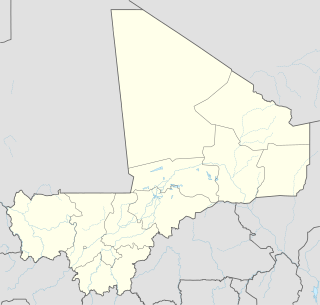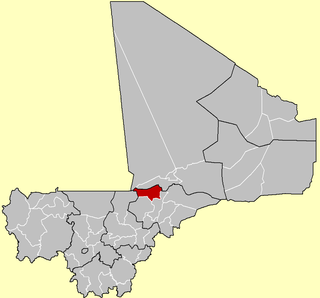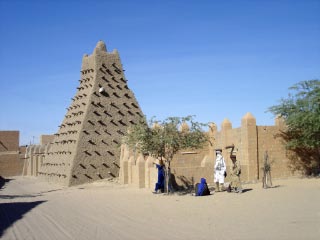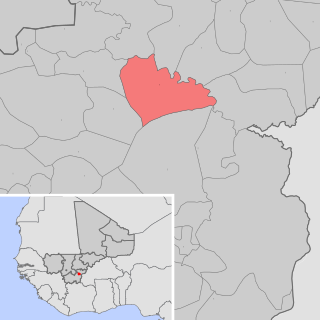| Sah | |
|---|---|
| Village | |
| Coordinates: 15°37′33″N4°2′56″W / 15.62583°N 4.04889°W Coordinates: 15°37′33″N4°2′56″W / 15.62583°N 4.04889°W | |
| Country | |
| Region | Mopti Region |
| Cercle | Youwarou Cercle |
| Commune | N'Dodjiga |
| Time zone | GMT (UTC+0) |
Sah (or Sa) is a village and seat of the commune of N'Dodjiga in the Cercle of Youwarou in the Mopti Region of southern-central Mali. [1] The village lies on the east (right) bank of the Bara-Issa, the smaller of the two branches of the Niger River that flow north out of Lake Débo.

N'Dodjiga is a commune of the Cercle of Youwarou in the Mopti Region of Mali. The commune contains about 50 small villages. The main village (chef-lieu) is Sah. In 2009 the commune had a population of 22,326.

Youwarou Cercle is an administrative subdivision of the Mopti Region of Mali. The administrative center (chef-lieu) is the town of Youwarou.

Mopti is the fifth administrative region of Mali, covering 79,017 km2. Its capital is the city of Mopti. During the 2012 Northern Mali conflict, the frontier between Southern Mali which is controlled by the central government and the rebel-held North ran through Mopti Region.
The French explorer, René Caillié stopped at Sah in April 1828 on his journey by boat from Djenné to Timbuktu. He was surprised at the extent of the commercial activity at what was then an important port:

Auguste René Caillié was a French explorer and the first European to return alive from the town of Timbuktu.

Djenné is a town and an urban commune in the Inland Niger Delta region of central Mali. The town is the administrative centre of the Djenné Cercle, one of the eight subdivisions of the Mopti Region. The commune includes ten of the surrounding villages and in 2009 had a population of 32,944.

Timbuktu is an ancient city in Mali, situated 20 km (12 mi) north of the Niger River. The town is the capital of the Timbuktu Region, one of the eight administrative regions of Mali. It had a population of 54,453 in the 2009 census.
There were in the port of Sa from four to five hundred persons seamen and inhabitants who gazed at the flotilla. The port was covered with bales of merchandise, ready to be shipped on board the canoes. The commercial activity appeared astonishing. There was something in the appearance of the flotilla far more interesting than I could have expected to find in the interior of Africa. The bustle on every side almost made me fancy myself in a trading port of Europe. The largest vessels belong to Moors, who carry on the principal trade of the country: they form themselves into companies and employ their canoes in conveying merchandise to Timbuctoo, where they are paid their freight in salt or cowries. [2]
Nowadays, boats use the larger branch of the Niger River, the Issa-Ber, and the port of Sah sees very little activity. [3]






